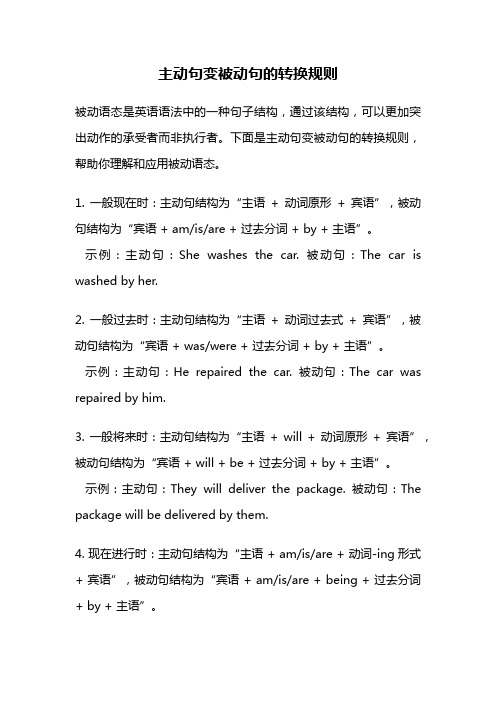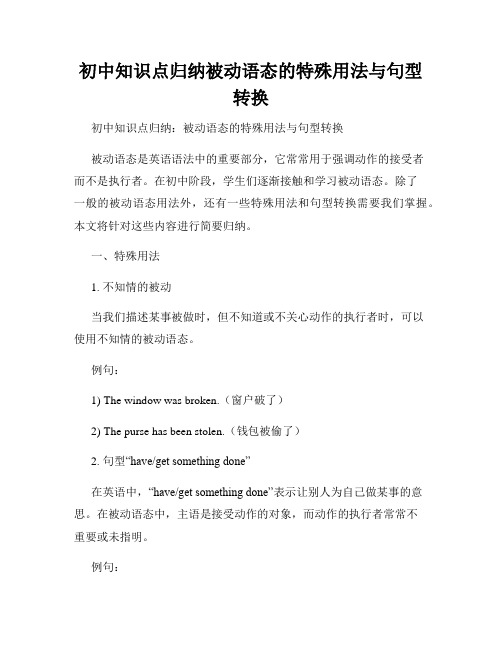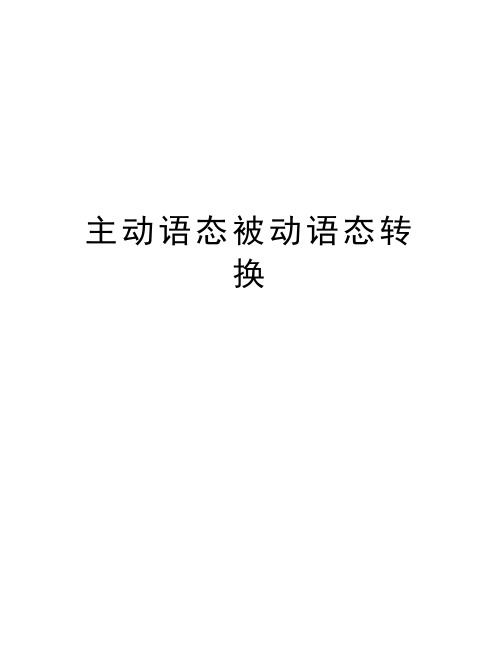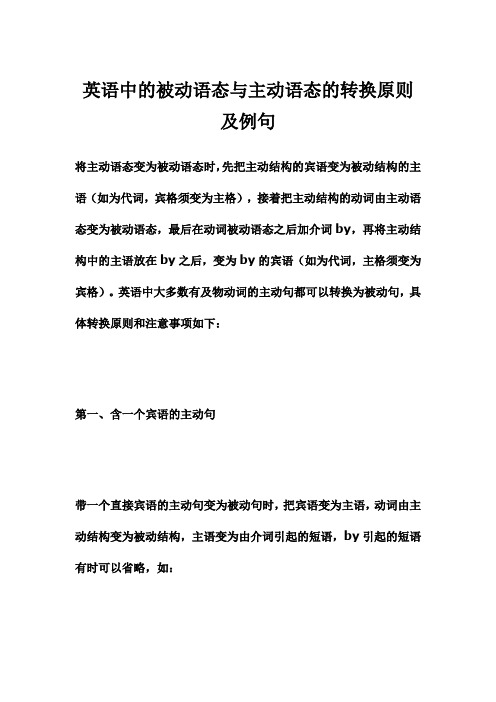英语主动句与被动句转换
主动句变被动句的转换规则

主动句变被动句的转换规则被动语态是英语语法中的一种句子结构,通过该结构,可以更加突出动作的承受者而非执行者。
下面是主动句变被动句的转换规则,帮助你理解和应用被动语态。
1. 一般现在时:主动句结构为“主语+ 动词原形+ 宾语”,被动句结构为“宾语 + am/is/are + 过去分词 + by + 主语”。
示例:主动句:She washes the car. 被动句:The car is washed by her.2. 一般过去时:主动句结构为“主语+ 动词过去式+ 宾语”,被动句结构为“宾语 + was/were + 过去分词 + by + 主语”。
示例:主动句:He repaired the car. 被动句:The car was repaired by him.3. 一般将来时:主动句结构为“主语+ will + 动词原形+ 宾语”,被动句结构为“宾语 + will + be + 过去分词 + by + 主语”。
示例:主动句:They will deliver the package. 被动句:The package will be delivered by them.4. 现在进行时:主动句结构为“主语 + am/is/are + 动词-ing形式+ 宾语”,被动句结构为“宾语 + am/is/are + being + 过去分词+ by + 主语”。
示例:主动句:She is writing a letter. 被动句:A letter is being written by her.5. 过去进行时:主动句结构为“主语 + was/were + 动词-ing形式+ 宾语”,被动句结构为“宾语 + was/were + being + 过去分词+ by + 主语”。
示例:主动句:They were preparing dinner. 被动句:Dinner was being prepared by them.6. 现在完成时:主动句结构为“主语 + have/has + 过去分词 + 宾语”,被动句结构为“宾语 + have/has + been + 过去分词 + by + 主语”。
初中知识点归纳被动语态的特殊用法与句型转换

初中知识点归纳被动语态的特殊用法与句型转换初中知识点归纳:被动语态的特殊用法与句型转换被动语态是英语语法中的重要部分,它常常用于强调动作的接受者而不是执行者。
在初中阶段,学生们逐渐接触和学习被动语态。
除了一般的被动语态用法外,还有一些特殊用法和句型转换需要我们掌握。
本文将针对这些内容进行简要归纳。
一、特殊用法1. 不知情的被动当我们描述某事被做时,但不知道或不关心动作的执行者时,可以使用不知情的被动语态。
例句:1) The window was broken.(窗户破了)2) The purse has been stolen.(钱包被偷了)2. 句型“have/get something done”在英语中,“have/get something done”表示让别人为自己做某事的意思。
在被动语态中,主语是接受动作的对象,而动作的执行者常常不重要或未指明。
例句:1) I had my hair cut.(我理了发)2) She got her car repaired.(她让人修了车)3. 句型“be to blame for”当我们想表达某事是由某人负责或应该为其负责时,可以使用“be to blame for”这一被动语态句型。
例句:1) He is to blame for the accident.(他应为这次事故负责)2) They were to blame for the delay.(他们应对耽搁负责)二、句型转换1. 主动句变被动句将主动句转换为被动句时,需要注意以下几点:1) 主语变为被动语态的主语;2) 动词使用被动形式(be+过去分词);3) 如果主动句中有宾语,需要将其变为被动语态句中的主语。
例句:1) 主动句:They build bridges.(他们建桥)被动句:Bridges are built by them.(桥被他们建造)2. 被动句变主动句将被动句转换为主动句时,可以根据以下步骤进行:1) 被动语态的主语变为主动语态的宾语;2) 被动语态的谓语动词变为主动语态的谓语动词;3) 被动语态的宾语变为主动语态的主语。
英语中的主动句被动句

主动句和被动句大多数“主-动-宾”结构的主动句都可以转换为被动句。
规则如下:(1)将原来的宾语变为主语,并将原来的主动态动词词组变为被动态动词词组。
例如:This factory produces machine tools.→Machine tools are produced in this factory.The found a wallet in the car.→A wallet was found in the car.They are repairing the bridge.→The bridge is being repaired.They have repaired the bridge.→The bridge has been repaired.They often make fun of her.→She is often made fun of.He took great care of his books.→His books were taken great care of.→Great care was taken of his books.(2)如果原句带有情态动词或半助动词,在变为被动句时,助动词不变,随后的主动词变为被动态。
例如:They should do this right now.→This should be done right now.They may be interviewing the applicants at the moment.→The applicants may be being interviewed at the moment.They must have finished their work.→Their work must have been finishedHe is likely to let you down.→You are likely to be let down.(3)当主动句变被动句,如果要强调施动者,可将原句主语置于by-词组中表达出来。
主动语态被动语态转换演示教学

主动语态被动语态转换主动语态被动语态转换主动句My father wrote the book.我父亲写了这本书。
被动句:The book was written by my father.这本书是我父亲写的主动句:Our village has built a plastic factory.我们村已经建了一座塑料厂。
被动句:A plastic factory has been built in our village.一座塑料厂在我们村建成了。
主动句:He gave me a dictionary.他给了我一本词典。
被动句:I was given a dictionary by him.被动句:A dictionary was given (to)me by him.主动句:He teaches us English.他教我们英语。
被动句:We are taught English by him.被动句:English is taught(to)us by him.英语是他教我们的。
主动句:We made him our group leader.我们让他当了我们组长。
被动句:He was made our group leader.他被选为我们的组长。
主动句:They chose Mr.Li their doctor in 1987.1987年他们选李先生当他的医生。
被动句:Mr.Li was chosen their doctor in 1987.1987年李先生被选为他们的医生。
主动句:We saw him enter the classroom.我们看见他进了教室。
被动句:He was seen to enter the classroom.他被看见走进了教室。
主动句:He made the boy sit down.他使那孩子坐下。
被动句:The boy was made to sit down.那孩子被迫坐下。
英语各时态的主动句和被动句

一般将来时(Simple Future):主动语态:明天我将会见我的朋友。
(I will meet my friend tomorrow.)被动语态:我的朋友将被我明天见到。
(My friend will be met by me tomorrow.)主动语态:下个月我将搬到一个新的城市。
(I will move to a new city next month.)被动语态:一个新的城市将被我下个月搬到。
(A new city will be moved to by me next month.)主动语态:明年我将开始学习弹钢琴。
(I will start learning to play the piano next year.)被动语态:学习弹钢琴将被我明年开始。
(Learning to play the piano will be started by me next year.)现在进行时(Present Continuous):主动语态:我正在看电视节目。
(I am watching a TV show.)被动语态:电视节目正在被我观看。
(A TV show is being watched by me.)主动语态:他们正在制定新的计划。
(They are making new plans.)被动语态:新的计划正在被他们制定。
(New plans are being made by them.)主动语态:我们正在等待朋友的到来。
(We are waiting for our friend's arrival.)被动语态:朋友的到来正在被我们等待。
(Our friend's arrival is being waited for by us.)现在完成时(Present Perfect):主动语态:我已经完成了我的工作报告。
(I have finished my work report.)被动语态:我的工作报告已经被我完成了。
英语中的被动语态与主动语态的转换原则及例句

英语中的被动语态与主动语态的转换原则及例句将主动语态变为被动语态时,先把主动结构的宾语变为被动结构的主语(如为代词,宾格须变为主格),接着把主动结构的动词由主动语态变为被动语态,最后在动词被动语态之后加介词by,再将主动结构中的主语放在by之后,变为by的宾语(如为代词,主格须变为宾格)。
英语中大多数有及物动词的主动句都可以转换为被动句,具体转换原则和注意事项如下:第一、含一个宾语的主动句带一个直接宾语的主动句变为被动句时,把宾语变为主语,动词由主动结构变为被动结构,主语变为由介词引起的短语,by引起的短语有时可以省略,如:主动句:People play football all over the world.被动句:Football is played all over the world.第二、含双宾语的主动句带一个直接宾语和一个间接宾语的主动句变为被动句时,只把其中一个宾语变为主语,如:主动句:My friend lent me those books.被动句:Those books were lent (to) me by my friend.第三、含两个直接宾语的主动句带有两个直接宾语的主动句变为被动句时,通常只把表示人的宾语改为主语,表示事物的宾语一般不变,如主动句:They asked him some questions.被动句:He was asked some questions (by them).第四、含that宾语从句的主动句当含有that的宾语从句的主动句变为被动句时,通常以间接宾语作为主语,that从句不变;主动句:She told me that the teacher would come soon.被动句:I was told that the teacher would come soon.第五、含复合宾语的主动句带有宾语和宾语补足语的主动句变为被动句时,把宾语变为主语,原来的宾语补足语保留不变,但在作用上为主语补足语。
主动语态被动语态转换

主动语态被动语态转换主动句My father wrote the book.我父亲写了这本书。
被动句:The book was written by my father.这本书是我父亲写的主动句:Our village has built a plastic factory.我们村已经建了一座塑料厂。
被动句:A plastic factory has been built in our village.一座塑料厂在我们村建成了。
主动句:He gave me a dictionary.他给了我一本词典。
被动句:I was given a dictionary by him.被动句:A dictionary was given(to)me by him.主动句:He teaches us English.他教我们英语。
被动句:We are taught English by him.被动句:English is taught(to)us by him.英语是他教我们的。
主动句:We made him our group leader.我们让他当了我们组长。
被动句:He was made our group leader.他被选为我们的组长。
主动句:They chose Mr.Li their doctor in 1987.1987年他们选李先生当他的医生。
被动句:Mr.Li was chosen their doctor in 1987.1987年李先生被选为他们的医生。
主动句:We saw him enter the classroom.我们看见他进了教室。
被动句:He was seen to enter the classroom.他被看见走进了教室。
主动句:He made the boy sit down.他使那孩子坐下。
被动句:The boy was made to sit down.那孩子被迫坐下。
主动句都能转换成被动句吗

6•当主动句的宾语是抽象名词时,不能转 换成被动句。例如:
Linda showed special interest in Chi nese^达对汉语 感兴趣。
不能转换成:Special interest in Chinese was showed by Linda.o
I decided to go to Shanghai on vaca tion. 我决定去上海度假。
不能转换成:To go to Shanghai on vacation is decided by me.
5•当主动句的宾语是执行者(主语)身上某 一部分或某一 时,不能转换成被动句。例 如:
The little boy raised his hand at once. 上 了手。
16•当主动句的谓语是某些不可分割的动 词短语时,不能转换成被动句。例如:
The man will always keep his word. 这
个人是
。
不能转换成: His word will always be kept by the man.。
17. 当主动句的谓语是表示“拥有”的及物 动词时 不能转换成被动句。 例如:
I don't know what he did yesterday.我 不知道他昨天做了什么。
不能转换成:What he did yesterday aren't known by me.o
14. 当主动句的谓语是表示“适合”的及物 动词时,不能转换成被动句。例如:
Does the pair of trousers suit you?这条 合适
- 1、下载文档前请自行甄别文档内容的完整性,平台不提供额外的编辑、内容补充、找答案等附加服务。
- 2、"仅部分预览"的文档,不可在线预览部分如存在完整性等问题,可反馈申请退款(可完整预览的文档不适用该条件!)。
- 3、如文档侵犯您的权益,请联系客服反馈,我们会尽快为您处理(人工客服工作时间:9:00-18:30)。
1.His parents are sending him abroad.
2.Our teacher gave me two books.
3.They call me little Li.
4.We must take food care of the old.
5.They made him go.
6. He gave her some money.
7. He bought her a watch.
8. She made him a new coat.
9. He wrote her a letter.
10. He answered me that question.
11. He broke the cup.
12.Lily told me that she would come back soon
13.Who swept the floor today?
14. He gave the boy an apple.
15. They watched the children sing that morning.
16. We must take good care of the young trees.
17. People believe that he is ill.
18. History is made by the people.
19. They arrived at a decision.
20. He looked into the question.
答案
1、He is being sent abroad by his parents.
2、Two books are given to me by our teacher.
3、I called little Li by them.
4、The old must be taken good care of by us.
5、He was made to go by them.
6、She was given some money. / Some money was given to him.
7、A watch was bought for her. / She was bought a watch.
8、A new coat was made for him.
9、A letter was written to her.
10.I was answered that question by him.
11. The cup was broken by him.
12. I was told by Lily that she would come back soon
13. Who the floor was swept by today?
14. The boy was given an apple.
15. The children were watched to sing that morning.
16. The young trees must be taken good care of.
17. It is believed that he is ill.(或:He is believed to be ill.)
18. The people make history.
19. A decision was arrived at.
20. The question was looked into.。
